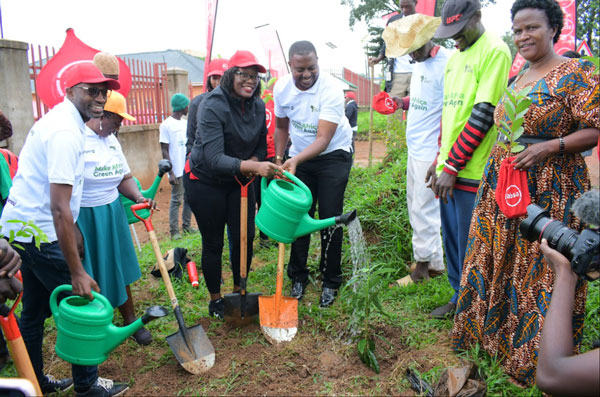
Hoima, Uganda | THE INDEPENDENT | Absa Bank Uganda has joined Hostalite Limited to plant 50,000 indigenous tree species in Hoima City, in a campaign dubbed Green Hoima. The campaign aims at planting trees in 33 primary schools, 4 tertiary institutions and 7 secondary schools in Hoima City.
Speaking at the launch of the initiative on Thursday, Absa’s Marketing and Customer Experience Director, Helen Basuuta Nangonzi, applauded Hoima City for the initiative aimed at mitigating the impact of climate change – which has affected people’s lives, citing at the recent flooding of River Katonga which negatively affected road transport.
“Such erratic weather patterns, deforestation, and ongoing loss of biodiversity are challenges that demand our attention. Today’s event is a step towards mitigating these challenges. By planting trees, we are enhancing the natural beauty of this region, providing shade, and creating a legacy that future generations can cherish,” she stated.
According to Global Forest Watch, in 2010, Uganda had 6.93 million hectares (Mha) of tree cover, extending over 29% of its land area. In 2022, the country lost 64.1 thousand hectares (Kha) of tree cover which is equivalent to equivalent to 33.3 Metric tons of Carbon dioxide emissions.
Hoima has been experiencing rapid population growth and this inevitably has an impact on the existing forest cover. In the 2002 population census, Hoima city had 343,600 people, and in 2012, after the discovery of oil, the Uganda Bureau of Statistics indicated that the population had increased to 548,800.
In addition to the oil and gas developments in the area, the city boasts of booming tourism industry with a beehive of activities in the nearby Murchison Falls National Park, Kibale National Park, Budongo Forest Reserve among other protected areas.
Nangonzi added that Absa Bank Uganda recognizes the importance of environmental sustainability in the face of these developments and the role that corporations must play in fostering a greener, and healthier planet.
“We are honored to contribute towards this initiative, which is aligned to Absa’s agenda to mitigate the impact of climate change and support environmental conservation. Absa is driven by a purpose to empower Africa’s tomorrow together…one story at a time. Our commitment to being a force for good and the sustainability journey that we have embarked on demonstrate this purpose by creating shared value for our communities,” said Nangonzi.
She stressed the role of collaboration in building a greener, healthier and more sustainable environment for generations to come.
“I urge all of us gathered here to see today not just as a one-time event, but as a starting point for a sustained effort to protect and preserve our environment. Each tree we plant represents hope, a promise of a better tomorrow. It is a small act that, when multiplied across communities and nations, can make a significant difference.”
The Hoima City Mayor Brian Kaboyo said that that everyone wants to tap into the oil sector and as such, Hoima is fast becoming a cosmopolitan town. He applauded Absa Bank for the contribution and urged other corporate entities to follow the suit.
The Chief Executive Officer Hostalite, under its sustainability project Greening Africa, Dickson Mushabe reaffirmed his personal commitment as well as that of his organisation to strategically tackle the effects of climate change by focusing on Sustainable Development Goal 13: Climate Action.
“Under this goal, we are deliberately running an African Initiative dubbed Green Cities, Green Africa by supporting organizations to plant trees and use innovative solutions to tackle the climate change challenges. We believe that every tree planted will not only transform the communities but have everlasting impact on the planet,” he said.
 The Independent Uganda: You get the Truth we Pay the Price
The Independent Uganda: You get the Truth we Pay the Price

